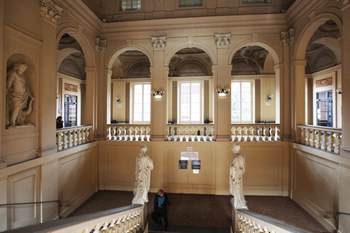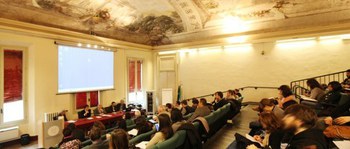History of the Department

The Department of Political and Social Sciences, founded in 2012, boasts a long-standing tradition within the Alma Mater. The Scuola Libera di Scienze Politiche di Bologna (The Free School of Political Science of Bologna) was established in 1893 as part of the Law Department, with Domenico Mantovani Orsetti at its head. However, the experience came to an end before the Great War. The Department of Political Sciences was established in 1964 and opened two years later by Nicola Matteucci, Luigi Bagolini and Beniamino Andreatta; the latter was also a statesman of the Italian Republic, and for this reason a street near the department’s office in Bologna bears his name today. The current library, on the other hand, was named after Matteucci, the first head of the Department of Political and Social Science founded in 1966. The aula magna of the Bologna campus (Palazzo Hercolani) is dedicated to Roberto Ruffilli, a scholar and member of the faculty who devoted himself to politics. Ruffilli was brutally murdered by the Red Brigades for his commitment to the reformation of the State. The second department, established in 2001 in Forlì, was also named after him.

Since its founding, the department has welcomed scholars who have also been involved in public life in various capacities, including members of parliament, ambassadors, consultants and columnists, thus contributing to the university's Third Mission, focused on social engagement. In terms of academia, the department hosts professors and researchers covering all the main disciplines of political and social sciences. They are involved in the main areas of research and contribute to important scientific journals. Today, the department is a reference point in the field of political and social sciences and international studies at both European and national levels. On a global scale, the department contributes to placing the University of Bologna in the top 100 universities in the world in the areas of Politics and International Relations and Sociology, and in the top 150 for Communication and Media Studies (according to the QS World University Rankings).
Our institution is not the amalgamation of parts or of the entirety of old structures and entities, but rather it is founded on an organization based on the sharing of a cultural, scientific and educational project involving the voluntary and individual participation of scholars from complementary and integrated fields of knowledge. Thus, the various disciplines intertwine pursuing common objectives to enrich the wealth of knowledge on political and social sciences acquired since the end of the 19th century, which is continuously updated to fit the new reality of the 21st century. The ten degree programmes offered by the department in the two campuses of Bologna and Forlì attract the highest number of students in Italy in the reference study areas, and are considered to be among the best in the country. This stimulating and innovative learning environment offers students a broad, interdisciplinary and international education.